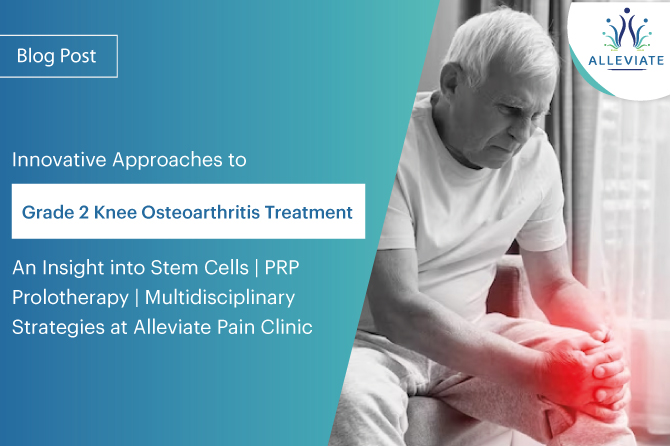Introduction
Knee osteoarthritis (OA) is a prevalent and debilitating condition affecting millions worldwide. While Grade 2 OA represents a moderate stage of cartilage degeneration, recent advancements in regenerative medicine and a multidisciplinary approach have revolutionized treatment options. This blog explores cutting-edge interventions, including stem cells, platelet-rich plasma (PRP), and prolotherapy, alongside the holistic approach practiced at Alleviate Pain Clinic, which incorporates physical therapy, clinical nutrition, and strength and conditioning for optimal Grade 2 knee osteoarthritis management.


Overview of Grade 2 Knee Osteoarthritis

Grades of Osteoarthritis in increasing order of severityKnee osteoarthritis is a progressive joint disorder characterized by the degeneration of articular cartilage, leading to pain, stiffness, and reduced mobility. In Grade 2 OA, cartilage loss is moderate, signaling the need for timely and comprehensive intervention.
Symptoms of Grade 2 Knee Osteoarthritis
- Pain : Individuals with Grade 2 knee osteoarthritis often experience pain, particularly during weight-bearing activities or movement of the joint. The pain may be intermittent but tends to worsen over time.
- Stiffness : Stiffness in the knee joint, especially after periods of inactivity, is a common symptom. This can make it challenging to start moving and may improve with gentle activity.
- Swelling : Mild to moderate swelling around the knee joint may occur due to inflammation associated with osteoarthritis.
- Decreased Terminal Range of Motion : As the cartilage deteriorates, the range of motion in the knee joint may be limited. This can affect activities that require bending or straightening the knee.
Traditional Approaches and Limitations
Conventional Treatment Modalities
Traditional approaches to knee OA often involve pain management, anti-inflammatory medications, and physical therapy. While these methods can provide symptomatic relief, they may not address the underlying structural damage or promote long-term joint health.Traditional treatments may fall short in preventing disease progression and fail to offer sustained relief. This emphasizes the need for innovative and regenerative strategies to enhance the body’s natural healing processes.
The Alleviate Pain Clinic Approach
Regenerative Medicine in Focus
Stem Cell Therapy : Utilizing Body’s Regenerative Potential


Dr Swagatesh with a Adipose derived Stem Cell Preparation at Alleviate Pain Clinic, Bengaluru Stem cell therapy involves the injection of mesenchymal stem cells derived from the patient’s own body or other sources into the affected knee joint. These cells have the potential to differentiate into various cell types, promoting tissue regeneration and reducing inflammation. [Reference: Centeno et al., 2019, American Journal of Sports Medicine]
PRP : Harnessing the Power of Platelets
Dr Swagatesh with a High concentration Platelet Rich Plasma Preparation at Alleviate Pain Clinic, BengaluruPlatelet-rich plasma (PRP) therapy involves extracting and concentrating platelets from the patient’s blood, which are then injected into the knee joint. Platelets release growth factors that stimulate tissue repair, modulate inflammation, and enhance healing. [Reference: Filardo et al., 2015, American Journal of Sports Medicine]


Prolotherapy : Boosting Ligament Strength
Prolotherapy, or proliferative therapy, is a technique involving injections of a solution, often containing dextrose, into the knee joint ligaments. This stimulates the body’s natural healing response, promoting the strengthening of ligaments and reducing pain. [Reference: Rabago et al., 2013, Clinical Medicine Insights: Arthritis and Musculoskeletal Disorders]
Multidisciplinary Collaboration
Alleviate Pain Clinic adopts a multidisciplinary approach that integrates various therapeutic modalities to address Grade 2 knee osteoarthritis comprehensively. The collaboration between medical professionals, physical therapists, nutritionists, and strength and conditioning experts ensures a holistic and personalized treatment plan.
Physical Therapy : Restoring Functionality
Physical therapy plays a pivotal role in alleviating knee OA symptoms. Tailored exercises help improve joint flexibility, strengthen supporting muscles, and enhance overall functionality. [Reference: Fransen et al., 2015, JAMA]
Clinical Nutrition : Fueling Joint Health
Nutritional interventions focus on anti-inflammatory diets, supplementation, and lifestyle modifications. Targeted nutritional support aids in reducing inflammation, supporting cartilage health, and optimizing the body’s response to regenerative treatments.
Strength and Conditioning : Building Resilience
Strength and conditioning programs, designed by experts at Alleviate Pain Clinic, aim to enhance muscle strength and joint stability. These programs are crucial for maintaining the benefits of regenerative interventions and preventing further degeneration.Patient Success Stories- A couple of happy patients video link. One can be Patient Selvamani- Indiranagar, another relatively younger patient happy with knee prp treatment
Conclusion
In the realm of Grade 2 knee osteoarthritis, the integration of regenerative medicine, specifically stem cells, PRP, and prolotherapy, with a multidisciplinary approach is transforming the landscape of treatment. Alleviate Pain Clinic’s commitment to personalized care, collaboration, and innovative therapies underscores the potential for a paradigm shift in how we approach knee OA. As we stride into the future, the combination of regenerative interventions and holistic strategies promises hope for improved outcomes and enhanced quality of life for individuals grappling with Grade 2 knee osteoarthritis.



